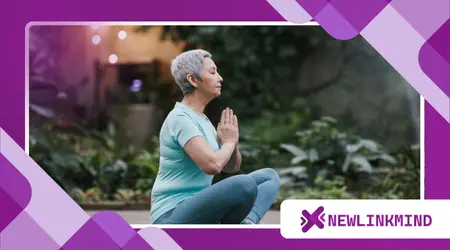The Mental Health Benefits of Yoga for Seniors

advertisements
mental health benefits of yoga for seniors, Yoga is increasingly recognized for its profound impact on well-being, and among its many advantages, the stand out as particularly significant.
As we navigate the complexities of aging, maintaining cognitive and emotional vitality becomes paramount.
The Aging Mind: A Landscape of Change
Aging brings unique mental health challenges. Retirement, loss of loved ones, and changes in physical ability can contribute to feelings of isolation and anxiety.
Many seniors grapple with conditions like depression and cognitive decline.
Understanding these challenges is the first step. We must acknowledge the nuanced emotional and psychological shifts that occur.
advertisements
This recognition paves the way for effective, compassionate interventions.
It’s a misconception that mental decline is inevitable.
The brain, though it changes, retains remarkable plasticity. We can actively support its health and resilience.
advertisements
This period of life offers immense potential for growth.
Seniors possess a wealth of wisdom and experience. Cultivating mental wellness allows them to share these gifts.
Yoga: A Holistic Approach to Mental Wellness
Yoga transcends mere physical exercise. It’s a comprehensive practice integrating mind, body, and spirit. This holistic nature makes it uniquely suited for senior mental health.
Through specific postures, breathing exercises, and meditation, yoga fosters a deep sense of inner calm. It’s a journey inward, promoting self-awareness and peace.
The gentle movements enhance circulation, which is vital for brain health. Improved blood flow supports cognitive function and memory.
Read more: Restorative Yoga for Seniors: Deep Relaxation at Any Age
Breathing techniques, or pranayama, regulate the nervous system. This helps reduce stress and promote relaxation, a powerful antidote to anxiety.
Meditation, a cornerstone of yoga, trains the mind.
It improves focus and reduces the tendency to dwell on negative thoughts. This mental discipline builds resilience.

Reducing Stress and Anxiety Through Yoga
Stress and anxiety are common companions for many seniors.
Yoga provides effective tools to manage these pervasive feelings. It offers a sanctuary from daily pressures.
Consider the sympathetic nervous system, responsible for our “fight or flight” response. Yoga actively downregulates this system.
It encourages a state of rest and digest.
Deep breathing exercises are particularly potent.
They signal to the brain that there’s no immediate danger. This simple act can profoundly shift one’s internal state.
The focus on present-moment awareness in yoga helps.
It draws attention away from worries about the past or future. This grounded presence is incredibly calming.
++ How Yoga Enhances Joint Health for Seniors
One example: imagine Sarah, a 78-year-old who felt constantly overwhelmed by daily news.
After a few weeks of consistent yoga, she found herself responding to stressors with a newfound calm. She still reads the news, but the intense grip of anxiety loosened.
Combating Depression and Elevating Mood
Depression can cast a long shadow over senior years. Yoga offers a pathway toward brighter emotional states.
It encourages a sense of agency and empowerment.
The physical activity in yoga releases endorphins. These natural mood elevators provide a significant boost. It’s like a natural antidepressant.
Connecting with a yoga community also plays a vital role.
Group classes reduce feelings of isolation. Shared experience fosters a sense of belonging.
The mindful movement cultivates body awareness.
This connection helps individuals recognize and process emotions. It’s a form of gentle self-discovery.
Yoga encourages a positive self-image.
Achieving even simple poses builds confidence. This sense of accomplishment directly combats feelings of hopelessness.

Enhancing Cognitive Function and Memory
Maintaining sharp cognitive abilities is a significant concern for seniors.
Yoga offers a promising avenue for supporting brain health. It’s an active form of mental engagement.
The intricate coordination required for many yoga poses stimulates neural pathways.
This mental challenge keeps the brain agile. It’s like a workout for your grey matter.
Check this out: How to Practice Safe Yoga at Home Without a Teacher
Improved oxygenation to the brain is another key benefit. Deep breathing and improved circulation nourish brain cells.
This enhanced supply supports optimal function.
A study published in the Journal of Alzheimer’s Disease in 2016 found that a specific yoga and meditation program (Kirtan Kriya) improved verbal memory and visual-spatial memory in older adults with mild cognitive impairment.
This research underscores yoga’s tangible cognitive benefits.
Focusing on breath and movement during practice enhances concentration.
This improved focus translates to daily tasks. It helps with recall and attention.
| Cognitive Benefit | How Yoga Helps |
| Memory Retention | Improved blood flow to the brain, specific meditative practices |
| Focus and Attention | Mindful movement, breath awareness, meditation |
| Problem-Solving | Enhanced neural connections, reduced mental clutter |
| Cognitive Flexibility | Learning new poses, adapting to variations |
Fostering Social Connection and Reducing Isolation
Loneliness is a silent epidemic among seniors.
Yoga classes provide a valuable opportunity for social interaction. They build bridges between individuals.
Sharing a common practice creates bonds. Participants encourage each other.
This supportive environment nurtures friendships.
The shared experience fosters a sense of community.
It moves beyond superficial interactions. People connect on a deeper, more meaningful level.
These social connections are crucial for mental well-being.
They combat feelings of isolation. Human connection is a powerful healer.
Imagine John, an 82-year-old widower who had become increasingly withdrawn.
His daughter encouraged him to try a senior yoga class.
He not only found physical relief but also began sharing stories and laughter with his classmates, rekindling his zest for life.
Building Resilience and Inner Strength
Life inevitably brings challenges. Yoga equips seniors with the tools to navigate adversity. It cultivates an inner reservoir of strength.
The practice teaches acceptance and non-judgment. This compassionate approach helps individuals cope with physical limitations. It promotes self-kindness.
Through consistent practice, one develops discipline. This self-mastery extends beyond the mat. It influences how one approaches daily life.
Yoga offers a perspective shift. It encourages gratitude for the present moment. This positive outlook helps in overcoming difficulties.
Just as a strong tree with deep roots can withstand a storm, a person with strong inner resilience can weather life’s inevitable challenges.
Yoga helps cultivate those deep roots.
Practical Considerations for Seniors and Yoga
Accessibility is key when considering yoga for seniors. Many studios offer chair yoga or gentle classes. These modifications make practice safe and enjoyable.
Consulting a doctor before starting any new exercise regimen is always advisable.
This ensures the practice is tailored to individual health needs. Safety comes first.
Finding a qualified instructor is crucial. Look for those experienced in teaching seniors. They understand the unique needs and limitations.
Listen to your body throughout the practice. Pain is a signal to stop or modify. Yoga is about self-care, not competition.
Consistency, even in small doses, yields the greatest benefits. A few minutes daily are more impactful than infrequent, long sessions.
Conclusion: Embracing a More Vibrant Senior Life
The mental health benefits of yoga for seniors are undeniable and transformative.
It’s more than just exercise; it’s a pathway to emotional balance, cognitive vitality, and profound peace. As we age, prioritizing our mental well-being becomes not just important, but essential.
Embracing yoga can lead to a more fulfilling, joyful, and mentally resilient senior life.
It offers a gentle yet powerful means to navigate the aging process with grace and strength.
Why wait to discover this profound wellspring of well-being?
Is yoga safe for all seniors?
Yoga is generally safe, but it’s crucial to consult a doctor first, especially if you have pre-existing conditions. Many classes offer modifications for various physical abilities.
How often should seniors practice yoga to see mental health benefits?
Even short, consistent sessions, like 15-20 minutes a few times a week, can yield significant benefits. Consistency is more important than duration.
Do I need to be flexible to do yoga?
Absolutely not. Yoga is about meeting your body where it is. Flexibility improves over time with practice, but it’s not a prerequisite.
What type of yoga is best for seniors?
Gentle yoga, chair yoga, restorative yoga, and Hatha yoga are often recommended. These styles focus on slower movements and longer holds, emphasizing safety and mindfulness.
Can yoga help with memory loss?
While yoga isn’t a cure for severe memory loss conditions, studies suggest it can improve cognitive function, including memory, in older adults and those with mild cognitive impairment.
